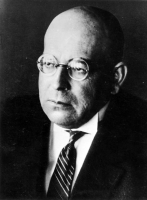| Oswald Spengler | |
| 奥斯瓦尔德·斯宾格勒 | |
| 奥斯瓦尔德·阿莫德·哥特弗里德·斯宾格勒 | |
|
阅读斯宾格勒 Oswald Arnold Gottfried Spengler在百家争鸣的作品!!! | |
奥斯瓦尔德·阿莫德·哥特弗里德·斯宾格勒(德语:Oswald Arnold Gottfried Spengler,1880年5月29日-1936年5月8日),德国历史哲学家、文化史学家及反民主政治作家。
《西方的没落》是斯宾格勒于1918-1922年出版的历史主义著作,在这本书中,斯宾格勒用自己的理论解释世界历史,反对将人类历史看作为总是不断进步的历史的一种直线型叙述(eine lineare Geschichtsschreibung)历史的观点,认为文化是循环的(Kulturzyklentheorie),文明在会经历新生、繁荣之后,最终会没落衰亡,而西方文明正处于衰落之中。本书出版之后成为欧洲和美国的畅销书,也引起了很大的争议。
《西方的没落》之后,他出版了《普鲁士和社会主义》等书,但在德国之外影响很小。他支持德国统治欧洲,认为这是拯救西方文明的正途。有些人将他视为保守革命的思想大师;而有些人(如戈培尔)则把他看作是纳粹主义的思想先驱,但他并不支持希特勒的纳粹主义,在1933年被纳粹驱逐。
1934年出版《决定时刻:德国与世界历史的演变》,旋即成为畅销书。本书批评了自由主义,但也批评纳粹的社会达尔文主义和反犹主义。虽然种族神秘主义在他的作品中扮演重要角色,但斯宾格勒一直反对纳粹的伪科学种族主义,因此该书后来在德国也被禁。作为德国的国家主义者,他认为纳粹的国家主义太狭隘,因此不足以担任统领欧洲的重任。本书也警告一场世界大战即将来临,西方文明要遭受重大威胁。
斯宾格勒对后来的一些历史学家影响很大,诸如阿诺尔得·汤恩比和弗兰茨·鲍克瑙(Franz Borkenau),但他的著作并没有成为当今历史科学(Geschichtswissenschaft)的奠基之石。
中文出版
- 《西方的没落》(全二卷),2006-10,译者:吴琼,上海:上海三联书店(简体中文)
- 《决定时刻:德国与世界历史的演变》,2009-8,译者: 郭子林 、 赵宝海 、 魏霞 ,上海:格致出版社,上海人民出版社(简体中文)
参考资料
- ^ So etwa Detlef Felken in seinem Nachwort des im C.H. Beck Verlag München erschienen Buches von Spengler Der Untergang des Abendlandes, „Daß Spengler Distanz zu den Nationalsozialisten hielt, darf jedoch nicht über das antidemokratische Potential der „Jahre der Entscheidung" hinwegtäuschen“, S. 1203
- ^ 刘蔚之,2007,《跨国知识转移研究:以中国对德国教育学的接受与转化(1928-1943)为例》,p.52 互联网档案馆的存档,存档日期2014-03-10.
- ^ Alexander Demandt, Spenglers Untergang, in: Die Literarische Welt, Beilage zu Die Welt, 27. März 1999.
- ^ Manfred Funke, Hitler, Deutschland und die Mächte: Materialien zur Aussenpolitik des dritten Reiches, Droste Verlag 1976, S. 433.
- ^ Carl von Ossietzky, Stefan Berkholz, Carl von Ossietzky, 227 Tage im Gefängnis: Briefe, Dokumente, Texte, Luchterhand Verlag 1988, S. 305.
Oswald Arnold Gottfried Spengler (German: [ˈɔsvalt ˈʃpɛŋlɐ]; 29 May 1880 – 8 May 1936) was a German historian and philosopher of history whose interests included mathematics, science, and art and their relation to his cyclical theory of history. He is best known for his two-volume work, The Decline of the West (Der Untergang des Abendlandes), published in 1918 and 1922, covering all of world history. Spengler's model of history postulates that any culture is a superorganism with a limited and predictable lifespan.
Spengler predicted that about the year 2000, Western civilization would enter the period of pre‑death emergency whose countering would lead to roughly 200 years of Caesarism (extraconstitutional omnipotence of the executive branch of the central government) before Western Civilization's final collapse.
Spengler is regarded as a nationalist and an anti-democrat, and he was a prominent member of the Conservative Revolution. However, he criticised Nazism due to its excessive racism. Instead, he saw Benito Mussolini, and entrepreneurial types, like the imperialist mining magnate Cecil Rhodes, as embryonic examples of the impending Caesars of Western culture, notwithstanding his stark criticism of Mussolini's imperial adventures.
He strongly influenced other historians, including Franz Borkenau and especially Arnold J. Toynbee and other successors like Francis Parker Yockey, Carroll Quigley and Samuel P. Huntington.
John Calvert notes that he is also popular with the Islamists, who mobilize his critique of the West.
